Zach Rolfe had to leave hospital by the back door on night of shooting, court hears
Zach Rolfe had to leave hospital via a back door on the night he shot and killed 19-year-old Kumanjayi Walker a court has heard, as new footage of the shooting is released. WATCH THE VIDEO
Northern Territory
Don't miss out on the headlines from Northern Territory. Followed categories will be added to My News.
ZACH Rolfe had to leave the Alice Springs Hospital via a back door due to community unrest on the night he shot and killed 19-year-old Kumanjayi Walker in Yuendumu in 2019, a court has heard.
The doctor who treated Rolfe just after midnight, Kerrie Sutherland, said she gave him a tetanus shot but a wound from where he had been stabbed by Mr Walker did not require stitches.
Dr Sutherland said she was aware the shooting had occurred after reading about it on social media, and that Rolfe was involved, but not that he had been the officer who pulled the trigger.
Reading from her notes from the time, Dr Sutherland said “he was acting as if he had lots of adrenaline”.
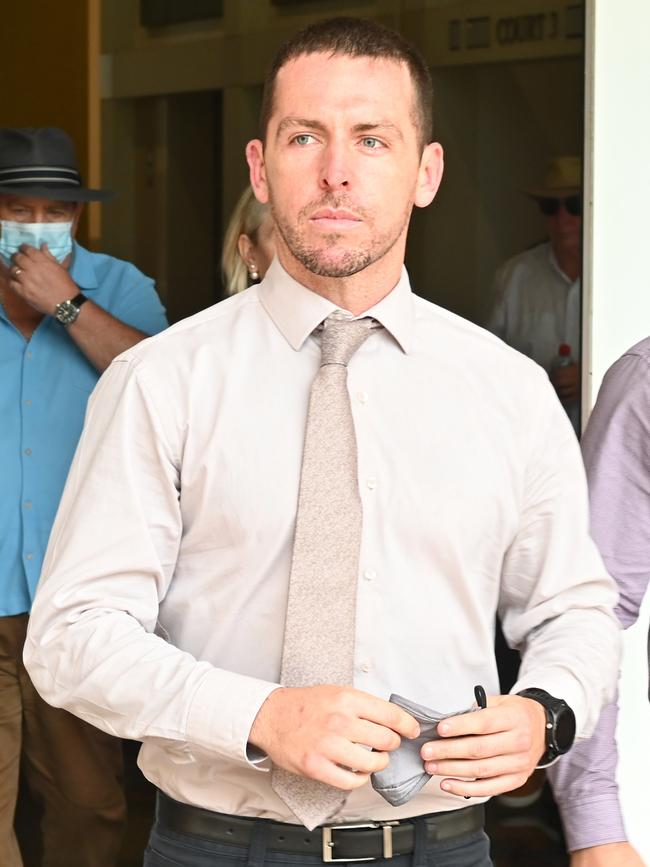
“He was happy to talk and be examined, but the main thing he wanted was a tetanus shot and then to get home,” she said.
“He wasn’t angry. He just wanted a tetanus shot and to get out of there.”
But Dr Sutherland said she was later told by the nursing staff Rolfe had ended up leaving by the hospital’s back door to avoid an angry crowd outside.
“There were lots of people and yelling and screaming outside from the public, and he just was keen to get out, to get home or somewhere safe,” she said.
“I didn’t see how many people, but we could hear them all from inside the department.”
Earlier on Thursday, Constable Anthony Hawkings, who witnessed the second and third shots Rolfe fired, told the court his police training was that death could follow stab wounds to certain parts of the body “within minutes”.
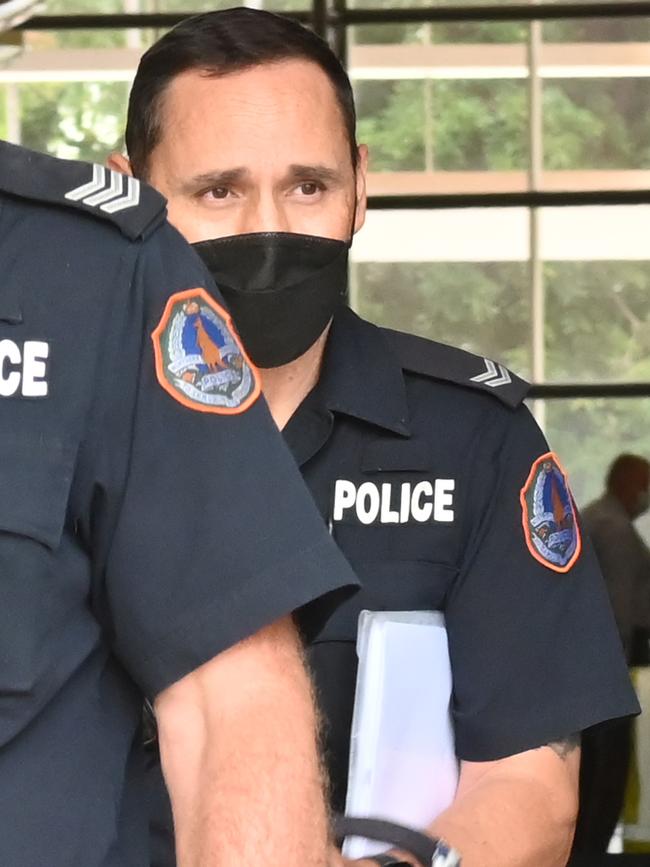
“If you are struck in a location where you have an artery, or a main blood vessel, with an edged weapon, and that vessel has been punctured or damaged, you could die in a very, very short period of time,” he said.
Const Hawkings also agreed under cross examination he was trained that “weapons don’t need to be big, sharp, or have a long blade to cause serious injury”, even “with minimal contact or application”.
Rolfe has pleaded not guilty to all charges and the trial continues on Monday.
Second of three shots at Kumanjayi Walker was the most likely to be fatal, trauma surgeon tells court
THE first of three shots fired into the body of Kumanjayi Walker would not have significantly impaired his ability to move the arm he used to stab Constable Zach Rolfe with a pair of medical scissors, a court has heard.
Rolfe has pleaded not guilty in the Supreme Court to murdering the 19-year-old, and two alternative charges, after shooting him three times during an arrest gone wrong in Yuendumu in 2019.
On Tuesday, experienced trauma surgeon and former Australian Army medic, Keith Towsey, told the court it was likely the second of the three shots that killed Mr Walker.
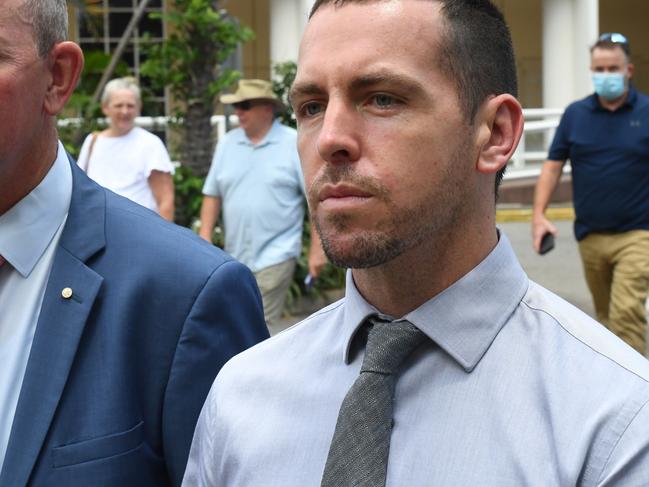
“All three wounds constitute serious harm in that they potentially provide, or cause, long term implications, they certainly warrant treatment,” he said.
“But I’d classify the wound from B1 (the second shot) which has traversed the major organs as being the one that’s going to cause death, I don’t believe the other two injuries would have caused death.”
Dr Towsey said he “wouldn’t consider the wound at A1 (the first shot) to have caused significant impairment to his ability to move his right arm”.
“It hasn’t struck any major organs to cause significant haemorrhage, it hasn’t affected the major muscle groups which provide power to the shoulder and it hasn’t affected any of the nerve supply to the shoulder,” he said.
“So anatomically I can’t see how the missile track of A1 would affect his ability to use his right arm.”
Dr Towsey also said his military training was to shoot at a target’s torso which “contains most of the major organs” as well as “the major blood vessels which connect the heart to those organs”.
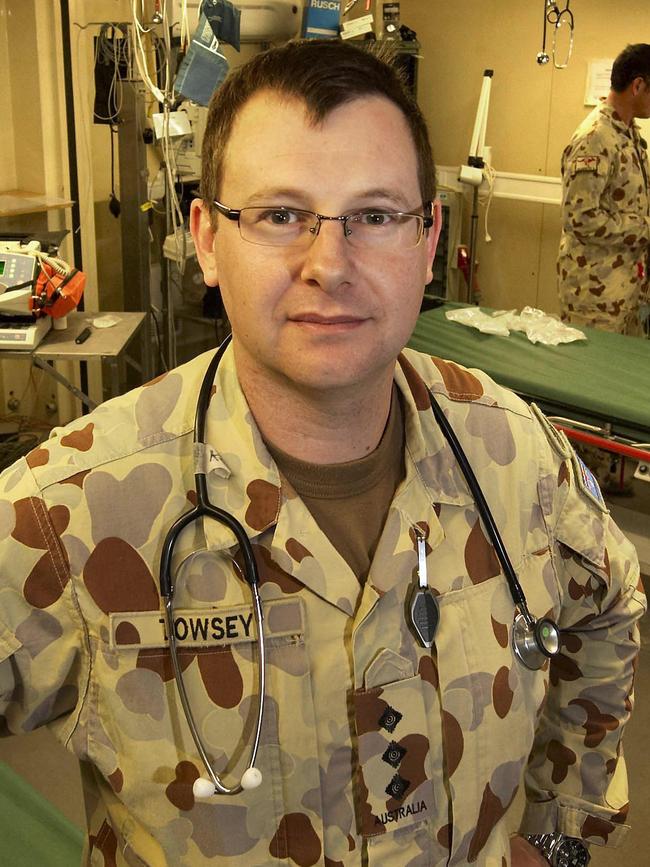
“The idea is that to shoot in that centre of mass is most likely to cause soon or immediate incapacitation of the target,” he said.
“The idea being that you neutralise the threat as soon as possible.”
Under cross examination by defence barrister, David Edwardson QC, Dr Towsey agreed that either of the blades of the scissors in question could have caused a fatal injury.
He also agreed that many household items, including credit cards, pens and keys could also deliver potentially lethal blows “if deployed to the right region with sufficient force”.
Dr Towsey said he had never been asked by prosecutors for a “formal report” on whether the scissors were a potentially lethal weapon, but had been sent a picture of them by the detective in charge of the investigation, and a male police officer had asked him about them on the phone.
“They wanted to know if someone stabbed someone in the neck with a pair of scissors could it be fatal and I said: ‘Yes, it can be’,” he said.
The trial continues.
Adoptive mother of shot teen takes the stand
KUMANJAYI Walker’s adoptive mother has taken the stand in the murder trial of the police officer who shot and killed him during an arrest gone wrong in Yuendumu in 2019.
Leanne Oldfield told the court Mr Walker was outside her home looking at family photos in the minutes before the fatal shooting on November 9, when Zach Rolfe approached the house.
She said Mr Walker was laughing as he looked at a photo before going back inside.
“As soon as he went inside I saw the police coming through the gate,” she said.
“I seen the guns.”
Mr Walker’s aunt, Louanna Williams, also testified on Thursday, telling jurors her nephew had denied being involved in any break-ins in the preceding days as police had suspected.
Ms Williams said Mr Walker also denied wanting to hurt anyone when he threatened police with an axe three days before he died.
“He told me that he never got involved in that,” she said.
“Then he told me about the incident that happened at Lottie and Eddie’s place, that he came out with an axe, but he never meant to hurt anybody there.”
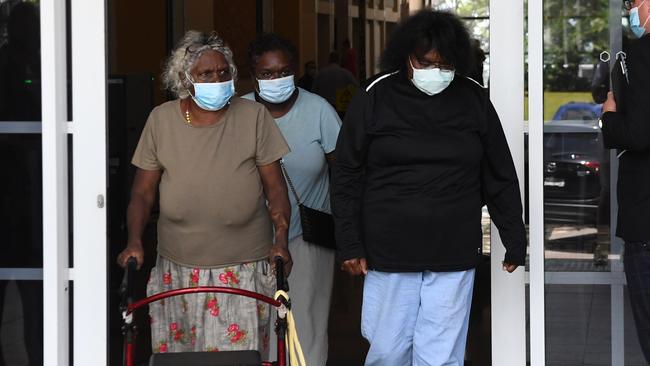
Ms Williams said Mr Walker had said he would hand himself in to Aboriginal Community Police Officer, Derek Williams, after his great uncle’s funeral on November 9.
“He told me that he wanted to be arrested after the funeral because he knew that he was in trouble,” she said.
“He was comfortable for Derek to arrest him.”
Rolfe has pleaded not guilty to all charges and the trial continues on Friday.
Zach Rolfe’s team member relives moment he saw him fatally shoot Kumanjayi Walker
ONE of Zach Rolfe’s Immediate Response Team (IRT) colleagues has relived the moment he saw his fellow officer fatally shoot Kumanjayi Walker at close range for the jury in his murder trial.
Taking the stand in the Supreme Court on Thursday, Constable Anthony Hawkings said he was covering the side of the house while Rolfe was inside attempting to arrest Mr Walker when he moved to the front after the first shot was fired.
“I saw the two final shots out of the three fired,” he said.
“I could see inside the doorway and there was just a struggle going on between three people and there were people outside the house that I could hear and see.”
Const Hawkings said he saw Rolfe struggling with Mr Walker – who was on a mattress on the ground with fellow IRT member, Constable Adam Eberl – with his weapon “very close” to the teenager.
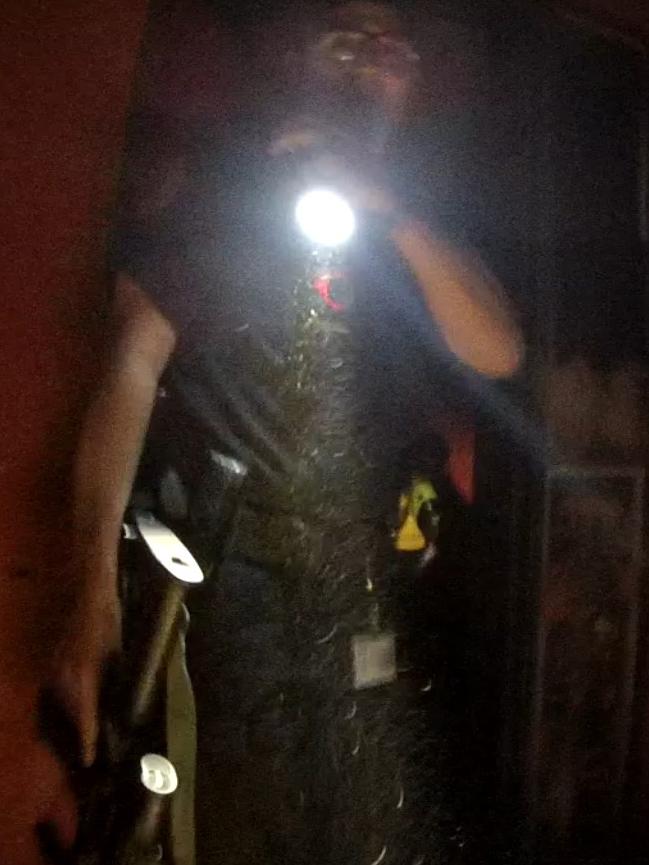
“I remember seeing (Rolfe) holding a firearm in his right hand and (pointing it) at the subject that was on the ground struggling,” he said.
“From my point of view I couldn’t gauge the distance, however, I knew that the (proximity) would have been extremely close, within a foot, very, very close (and pointed towards) the torso area.”
Const Hawkings said “there was a fair bit of movement happening at that time” but he thought Mr Walker was neither “flat down” nor “flat up” but on “more of a side angle”.
“I don’t think I entered the room at all from what I recall,” he said.
“I was covering the two officers at that time, I was covering the doorway to ensure that nobody else was going to come through from the outside of the house.
“I was keeping people back, so I was observing the incident that was occurring inside the house, between that and telling people to stay back from approaching the area I was covering.”
Rolfe has pleaded not guilty to all charges and Const Hawkings will resume his evidence when the trial continues on Friday.
NT Police Assistant Commissioner Travis Wurst disputes colleague’s testimony over response team deployment
NT POLICE Assistant Commissioner Travis Wurst has become the most senior officer to testify in the trial of one of his men charged with murdering a 19-year-old Indigenous man.
Constable Zach Rolfe has pleaded not guilty to all charges in relation to the fatal shooting of Kumanjayi Walker during an arrest gone wrong in Yuendumu on November 9, 2019.
Mr Wurst took the stand in the Supreme Court on Thursday, telling jurors he formally approved the deployment of Rolfe’s specialist Immediate Response Team (IRT) on the day of the shooting, but only in a “general support” capacity.
He said the request to dispatch the IRT from Superintendent Jody Nobbs was not made because the operation was considered “a high risk deployment”.
“The IRT, as I understood it, was just a collection of front line officers from within Alice Springs and the explanation provided to myself was that the people attached to that unit, or linked to that unit, whenever there was a requirement for extra duty, they were responsive,” he said.
“Supt Nobbs was intent on providing additional support into Yuendumu and that could have been any front line members, they didn’t need to be linked to this particular team.”
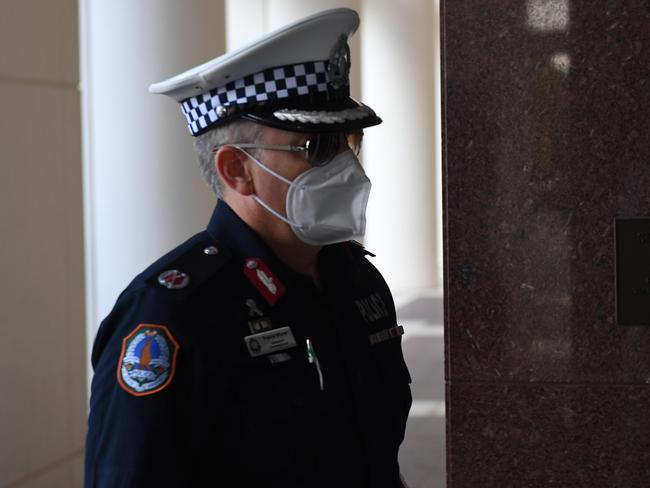
Under cross examination by defence barrister, David Edwardson QC, Mr Wurst disagreed with earlier testimony from Supt Nobbs that the intention was to “send out highly skilled, highly trained, highly disciplined, highly competent capability” after Mr Walker threatened police with an axe three days earlier.
“At that point in time, none of that was the case because (the IRT) was being developed from a conceptual idea, to coming to fruition, so at that point in time I wouldn’t suggest that was the case at all,” he said.
“I wasn’t deploying the IRT as the IRT, I was deploying officers to support the police at Yuendumu for respite.”
Mr Wurst said he was not aware the IRT officers would be conducting surveillance to try to find Mr Walker that night and he understood it was intended for Mr Walker to hand himself in after a funeral for one of his relatives.
“My understanding was that the intent around the apprehension related to the funeral that was going to occur later that day and their efforts would be undertaking utilising family and family relationships to facilitate the surrender,” he said.
The trial continues.
Police searched for Kumanjayi Walker’s partner minutes before he was fatally shot
THE father of Kumanjayi Walker’s partner rang her to tell her police were looking for her minutes before he was fatally shot by NT Police constable Zach Rolfe, a court has heard.
Ethan Robertson told jurors in Rolfe’s murder trial that Mr Walker left his house with his daughter, Rakeisha, shortly before police arrived on November 9, 2019.
He said he rang Rakeisha soon after they left and shortly before Rolfe confronted Mr Walker in another house but she didn’t answer.
“I was going to tell my daughter that they were looking for Kumanjayi,” he said.
Mr Robertson said he was also present at the same house three days earlier when Mr Walker rushed at two other police officers armed with an axe.
“I just sing out and yelled out,” he said.
“Stop, stop, stop, police have guns, so stop doing that.”
Rolfe has pleaded not guilty to all charges and the trial continues.
Rolfe’s team member denies ‘trying to help’ in murder trial
A MEMBER of Zach Rolfe’s Immediate Response Team who was with him on the night he fatally shot Kumanjayi Walker has denied telling his murder trial he doesn’t “recall” much of what happened “to try and help” his fellow officer.
Constable James Kirstenfeldt first took the stand on Tuesday, repeatedly telling the court “I don’t recall” in response to questions from Crown prosecutor Philip Strickland SC.
Const Kirstenfeldt said while “it was suggested that we go and arrest him at around about 5 o’clock in the morning”, he had never seen an email from Sergeant Julie Frost detailing the plan.
But when he returned to the witness box on Wednesday, Mr Strickland played footage of an interview Const Kirstenfeldt gave investigating police shortly after the shooting in which he told the officers he had “skimmed through it”.
“I’m pretty sure she sent the plan that we were going to do what we’d do anyway which was just intel gather and snatch him in the early morning,” he told the officers.
“I think we formulated our own arrest plan.”
On Wednesday, Mr Strickland asked Const Kirstenfeldt whether in giving “don’t recall answers”, he thought it would “help Mr Rolfe in this case”?
“Your evidence that you don’t recall being given an email by Julie Frost and you don’t recall what its contents were, are those answers given to try and help Mr Rolfe?” he asked.
Const Kirstenfeldt replied: “No, it’s because I don’t recall the exact content of that email.”
Mr Strickland asked Const Kirstenfeldt if he had planned to “actually go into a house and try to arrest (Mr Walker)” while doing “reconnaissance” on the evening of the shooting, to which he replied “If we came across him”.
“Our intention was to try and do some reconnaissance to try and find out where he was and where he would be,” he said.
“If we came across him while we were doing that, don’t just tell him to wait there till 5 o’clock in the morning, grab him now.”
Body worn footage of Const Kirstenfeldt running towards the sound of gunshots on the night of the shooting was also played to the court and he described for the jury being present in the aftermath, “doing your best to save his life”.
“I saw that he had three holes, I was of the assumption that one was an exit wound where a bullet had travelled all the way through and exited because I only heard two gunshots,” he said.
In response to a question about whether police were taught that shooting a person in their torso could result in serious harm or death, Const Kirstenfeldt said it was “pretty common sense”.
“I don’t think we were taught that, it seems to be common sense to me,” he said.
Rolfe has pleaded not guilty to all charges and the trial continues in the Supreme Court.
First Immediate Response Team member takes the stand
THE first member of Zach Rolfe’s Immediate Response Team dispatched to Yuendumu the night he shot and killed Kumanjayi Walker has taken the stand in his murder trial.
Constable James Kirstenfeldt, like Rolfe, a former soldier, told the Supreme Court jury the mission “to arrest Walker” on November 9, 2019 was just his second or third call-out with the IRT.
He said he drove from Alice Springs to Yuendumu with Rolfe as his passenger, arriving at about 6.30pm, where he met with officer in charge, Sergeant Julie Frost.
“We were trying to get information out of her, what we were doing, where he was, what houses he’s likely to be at,” he said.
“She had a map and she pointed to a dozen houses or so.”
Const Kirstenfeldt said he did not “recall there being a plan” and he was “unaware” of any established police practice of effecting arrests in the early hours of the morning.
“I believe it was suggested that we go and arrest him at around about 5 o’clock in the morning,” he said.
But he said he remembered his instructions were that the IRT would deploy that evening “once the whole team had arrived”, with CCTV footage showing the officers leaving the station at about 7pm.
“We talked about going out for a drive and doing some recon of the places she pointed out,” he said.
“I’d never been there before so we didn’t know our way around.”
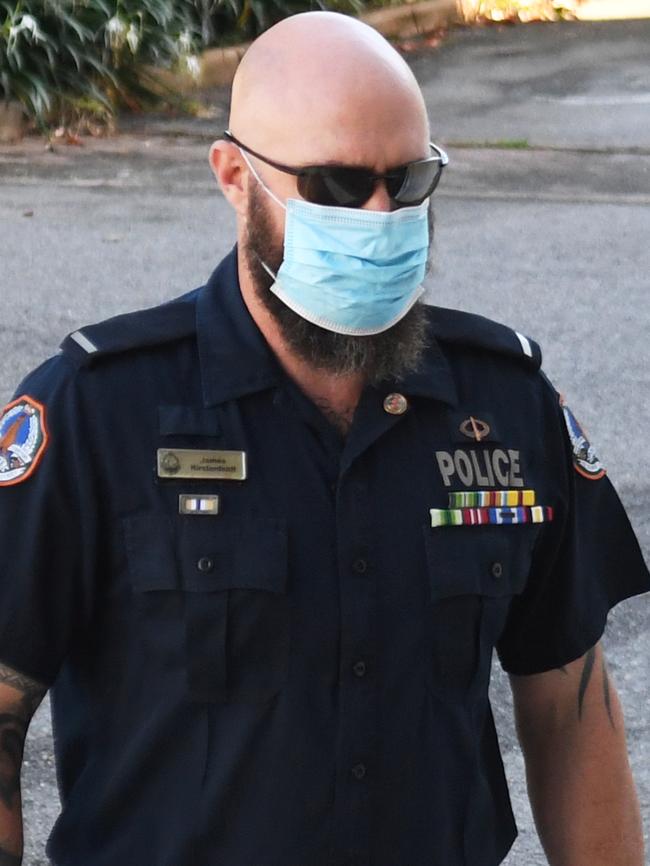
In response to questioning from Crown prosecutor, Philip Strickland SC, Const Kirstenfeldt repeatedly said “I don’t recall” but noted Sgt Frost had said “If you come across him, grab him”.
Earlier on Tuesday, local Yuendumu police constable, Felix Alefaio, said he heard Sgt Frost discussing the early morning arrest plan with Rolfe and Constable Kirstenfeldt.
Const Alefaio said he overheard Sgt Frost “briefing” the IRT members who “were there to arrest Mr Walker”.
“Julie wanted (Rolfe) and his partner at the time, to go out and do some patrol around community,” he said.
“I believe, if I can recall, for them to wait until midnight that day and then the other two IRT members will come in and take over from 12 midnight till morning.”
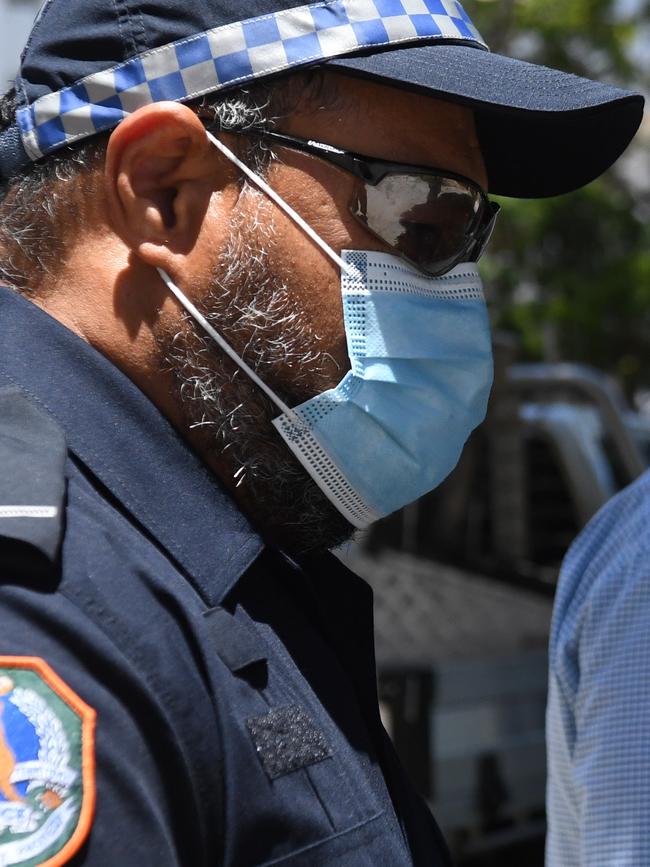
Const Alefaio said he heard the other officers discussing a plan to “gather intel and try to find out Mr Walker’s whereabouts” from about 7pm.
“From that, information to be provided to, I believe, back to Julie Frost and the plan was to go in the morning at about 5-5.30 the next morning and arrest him,” he said.
“From 5am she wanted me to accompany the IRT team, squad, to go and arrest Mr Walker, but I believe we were told that IRT members will deal with the arrest.
“I was there just to make sure that I identify Mr Walker correctly before they arrest him.”
Rolfe has pleaded not guilty to all charges and Const Kirstenfeldt will continue his evidence when the trial continues on Wednesday.
Kumanjayi Walker’s uncle takes the stand in Zach Rolfe murder trial
KUMANJAYI Walker’s uncle, Aboriginal Community Police Officer, Derek Williams, has relived the night his nephew lost his life for jurors in Zach Rolfe’s murder trial.
Rolfe has pleaded not guilty to all charges after fatally shooting the 19-year-old during an arrest gone wrong in Yuendumu in 2019.
Mr Williams took the stand on Tuesday, telling the court he had known Mr Walker all his life, remembering him as a “quite shy, young fella”, who’s biological mother had sniffed petrol before he was born, leaving him “a bit slow”.
Mr Williams said he had arrested his nephew four times in 2018-19 in his ACPO role and he had never tried to run away.
“When I said I was going to arrest him, he said ‘I’m going to jump on with you because you my family’ and off he went to the police station in the front seat (of the police car),” he said.
Mr Williams said he had understood Mr Walker was to hand himself in to police on the day after his death on November 9, following the funeral of one of his family members.
“We was at the gravesite and a young fella came rushing down and told us that Kumanjayi was shot,” he said.
“I jumped in with my father and we drove down to the crime scene.”
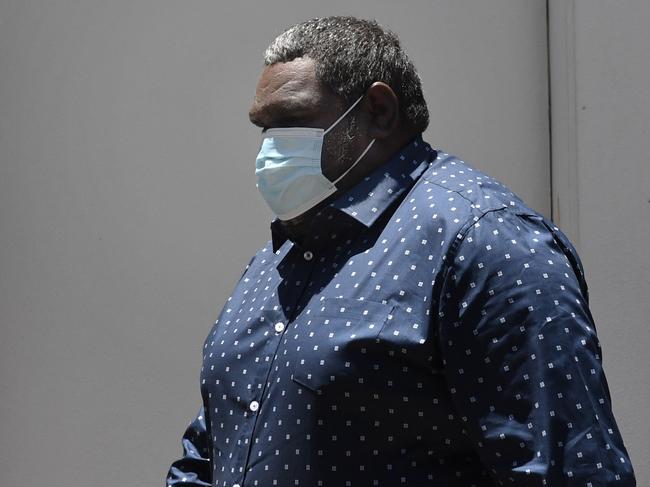
Mr Williams said he went back to the house where the fatal shooting occurred but didn’t touch anything, locking the door behind him, before heading to the police station where he tried “to calm everybody down”.
“People was yelling and screaming and wanted to throw rocks at the station,” he said.
The trial had resumed following a short delay on Tuesday morning in which one of the jurors was discharged.
Justice John Burns brought the 13 remaining jurors, including two reserves, back into court at about 11am to share the news that the trial would continue.
“The juror who has been discharged was a member of the jury and not a reserve juror so that I am now required under the laws of this Territory to conduct a ballot to determine which of the two reserve jurors will now become a member of the jury,” he said.
“Both the accused and the Crown have accepted the assurances given by the remaining members of the jury that they are able to address the issues in this trial in an unbiased fashion, so on that basis the trial will proceed, as I said, with a reduced number of jurors.”
The trial continues.
Zach Rolfe’s ‘close mates’ testify as second week of trial begins
TWO of Zach Rolfe’s “close personal friends” in the NT Police force have testified at his trial for the alleged murder of Yuendumu teenager Kumanjayi Walker in November 2019.
Constable Mitchell Hansen, who was in Rolfe’s patrol group at the time, told the Supreme Court on Monday he felt “fairly ill” when he first saw footage of Mr Walker rushing at two other officers with an axe, three days before his death.
“I think I was on an evening shift so, you know, I finished late the night before, started mid-afternoon, so when I got to work, the first thing I saw was that axe incident,” he said.
“So when I saw Walker raise an axe to my fellow police officers, I hadn’t heard whether or not someone had been injured or killed in the previous shift or whenever that incident occurred.
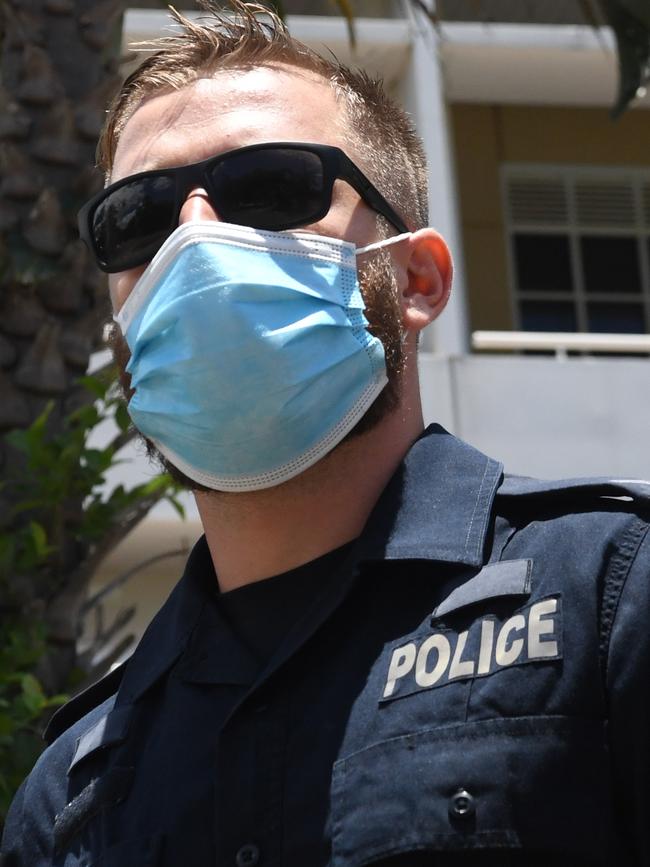
“And so I wholeheartedly believed that Walker was about to kill or severely injure one or both of those members. So when I saw that, I felt quite ill.”
Const Hansen said he was taught that if an offender had an edged weapon “I should have my firearm drawn”, in a scenario where the person was running towards him with a knife.
“They said to us ‘When this person runs at you, as soon as you see them moving, draw your firearm and take a well aimed sight picture’, essentially,” he said.
“And that was how they reinforce to us that a person can cover that ground so quickly and that’s why we should have our firearms drawn.”
Constable Breanna Bonney also took the stand on Monday, telling jurors she was taught in her police training that “edged blade equals gun”.
Under cross examination by defence counsel, David Edwardson QC, Const Bonney agreed that a “weapon” could be a knife or a shard of glass.
“It could be a whole host of other items, all of which have the capacity to implement lethal force against a police officer, if deployed?” Mr Edwardson asked.
Const Bonney replied: “Yes.”
Rolfe has pleaded not guilty to all charges and the trial continues on Tuesday.
IRT member ‘100 per cent’ prepared to shoot, court hears
A FORMER member of Zach Rolfe’s Immediate Response Team would draw his Glock if confronted with an edged weapon and be “100 per cent” prepared to use it, but “it’s not about trying to kill” anyone, a court has heard.
Senior Constable Shane McCormack told Rolfe’s murder trial on Monday while he was not one of the IRT members deployed to Yuendumu on the day Kumanjayi Walker was killed, he had been on the squad for about 1.5 years at the time.
Under cross examination by Rolfe’s barrister, David Edwardson QC, Const McCormack said he was familiar with the phrase “knife equals gun” from his work across two police forces in both Australia and New Zealand.
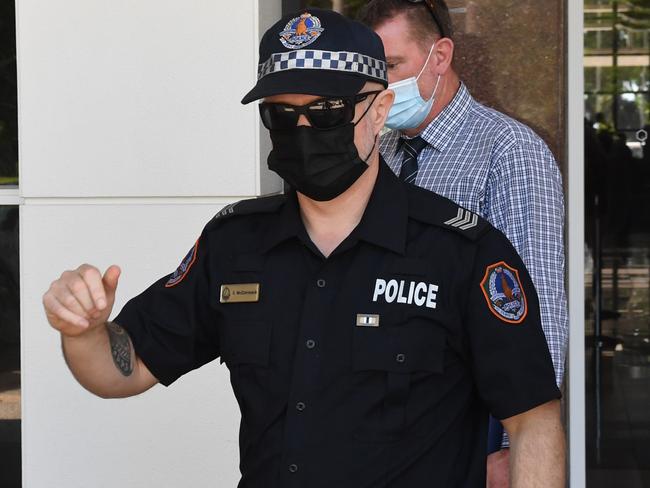
“It means that if you present a knife to me, I’m not going to take out a knife as well, we’re not going to have a knife fight, that’s not how it’s going to work,” he said.
“I’ve been given a tool to protect me and other people, the government sees fit for me to have that tool – you take out a knife you’ve increased the level of force I may use.
“It doesn’t even have to be a knife … if I see someone there with a baseball bat I’m going to draw my gun, a hammer I’m going to draw my gun.”
Const McCormack said there was no limitation on how many shots he would fire and it would depend on what was required to incapacitate the person posing the threat.
He said it was a question of “how many I deem to stop that person doing what they’re doing”.
“We don’t go to work to have to discharge our firearm, at the end of the day we’re here to help people, not hurt people,” he said.
“However if those times come, I’m the one that turns around and says ‘This is how many rounds I believe will stop them doing what they’re doing’.
“So it’s not about trying to kill them, it’s about trying to stop them doing the whole reason I had to use force in the first place.”
Mr Edwardson produced Const McCormack’s Glock holster with a replica pistol inside to help him demonstrate “a state of readiness” for the jury.
“A state of readiness could be in several ways,” Const McCormack said.
“I could have my hand on the gun, I could have unclicked the top bit, I might not have unclicked the top guard bit, but yeah of course I’m in a state of readiness.”
Rolfe has pleaded not guilty to all charges and the trial continues.
MONDAY, 11AM: SENIOR POLICE OFFICER SIGNS OFF ON ARREST PLAN
THE Superintendent of NT Police’s Southern Desert Division signed off on a plan to arrest Kumanjayi Walker in the early hours of the morning following what would be his fatal shooting by Constable Zach Rolfe, a court has heard.
Rolfe has pleaded not guilty to murdering Mr Walker, along with two alternative charges, during an arrest gone wrong in Yuendumu in 2019, with his trial entering its second week on Monday.
In giving evidence, Superintendent Jody Nobbs said he spoke to the Sergeant in charge of Rolfe’s Immediate Response Team, Julie Frost, on the afternoon of November 9 to go over the plan to arrest Mr Walker.
Supt Nobbs said in the conversation, he endorsed the plan to arrest Mr Walker at about 5am on November 10 after he had threatened officers with an axe three days earlier and “articulated that as being my expectation in terms of the preferred course of action”.
“The 5am element, I guess, is a tried and tested framework that utilised my 24 years experience with the police service in terms of risk mitigation in effecting an arrest with someone that has such a violent antecedence,” he said.
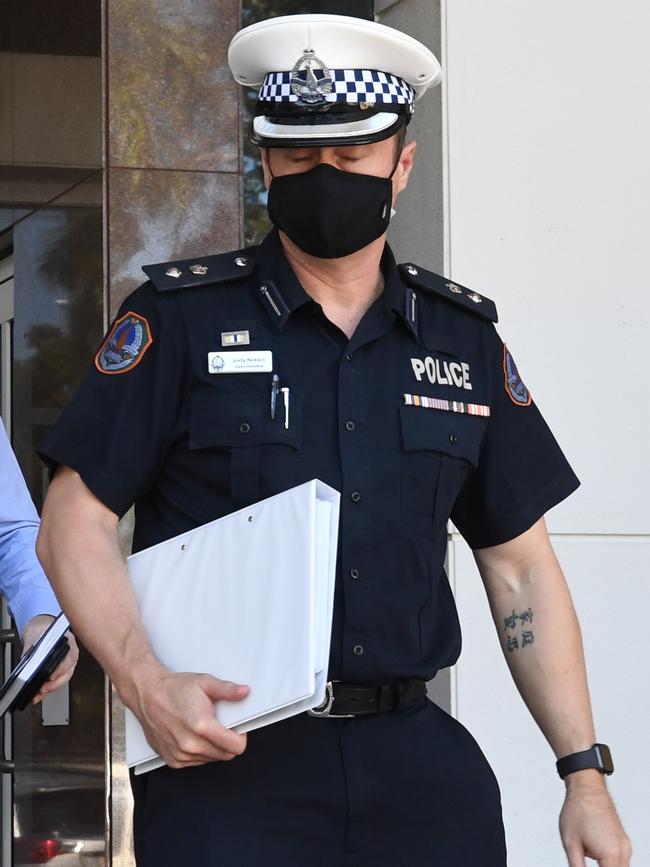
“It tips the opportunities in our favour, it gives us effective time, the cover of darkness, to establish our cordon, our containment, put our negotiational elements in order, (we can) walk up to a door and commence a conversation with presumably a house that are asleep at that given time.
“It makes it easier for us to engage them, less opportunity for access to weapons, fleeing and again it just gives us the element of surprise, for lack of a better term.”
But under cross examination by defence barrister, David Edwardson QC, Supt Nobbs agreed that Sgt Frost’s decision to deploy the IRT for “intelligence gathering” on Mr Walker’s whereabouts on the evening of November 9 was contrary to the plan he approved.
Supt Nobbs also agreed that any plan had to be “dynamic and adaptable” to be effective.
“If the offender, in this case, Kumanjayi Walker, has secreted, or armed himself with, a weapon, a potentially lethal weapon, and seeks to deploy it, then of course the response is going to be completely different to what might have been contemplated in your plan in an ideal world?” Mr Edwardson asked.
Supt Nobbs replied: “Correct”.
The court earlier heard Mr Walker had stabbed Rolfe with a pair of surgical scissors prior to the fatal shots being fired.
The trial continues.
More Coverage
Read related topics:Local Crime NT





